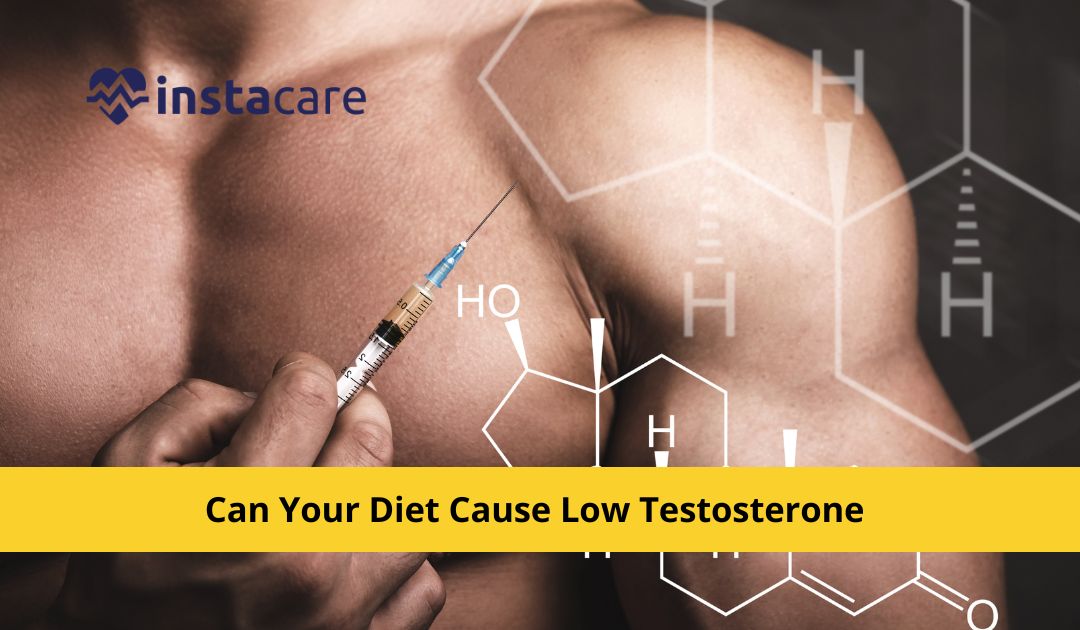Low testosterone levels can significantly affect a man's health and overall well-being. While factors such as age and genetics contribute to declining testosterone. The found influence of diet often remains underestimated. This blog aims to shed light on the intricate relationship between your dietary choices and low testosterone levels.
By getting into this connection, we will equip you with insights into how foods and nutrients can impact your hormone balance. Maintaining optimal testosterone levels requires a good understanding of your diet both physically and mentally.
The Importance of Testosterone
Before examining dietary factors, it's vital to grasp the importance of testosterone. This hormone, primarily synthesized in the testes, plays a pivotal role in:
- Muscle growth and strength.
- Bone density maintenance.
- Libido and sexual function
- Mood regulation
- Energy levels
Dietary Factors that Can Lead to Low Testosterone
Now that we recognize the significance of testosterone. let's explore the dietary factors that can potentially lead to low testosterone levels.
High Sugar Intake
Eating too much sugar, like sugary drinks and processed foods, can cause a problem called insulin resistance. This can make your body struggle to control sugar levels in your blood. And guess what? It's connected to lower testosterone levels, which is not good for your health. So, be mindful of sugar in your diet to help keep your testosterone in check!
Low Fat Intake
Your body needs healthy fats, like those in avocados, nuts, and
olive oil, to make hormones, including testosterone. If you don't eat enough of
these good fats, it can make it harder for your body to produce testosterone.
So, make sure you include these tasty and healthy fats in your diet to keep
your testosterone at a healthy level!
Inadequate Protein Consumption
Protein provides the amino acids necessary for the production of various hormones, including testosterone. A diet lacking in sufficient protein can potentially lead to lower testosterone levels.
Zinc Deficiency
Zinc is like a superhero mineral that helps your body make testosterone. But if your diet doesn't have enough zinc-rich foods, like oysters, beef, and nuts, it can make your testosterone go down. So, don't forget to add these yummy foods to your meals to help keep your testosterone levels up and your body healthy!
Alcohol Consumption
Excessive alcohol consumption can lead to hormonal imbalances and decrease testosterone levels. It also affects the liver's ability to metabolize hormones, further impacting testosterone production.
View More: Implantation Bleeding - Causes Symptoms And Treatment
Dietary Strategies for Optimizing Testosterone Levels
Now that we know which foods can lower testosterone, let's talk about how to keep your hormones balanced with your diet. We'll share some tips and tricks to help you eat in a way that supports your hormone health.
Balance Your Macronutrients
Ensure your diet includes a balanced mix of carbohydrates, fats, and proteins. Avoid extreme diets that eliminate any of these macronutrients, as they can negatively affect hormone production.
Choose Healthy Fats
Adding healthy fats to your meals is a smart move. Foods like avocados, nuts, seeds, and olive oil are packed with these good fats. They help your body make hormones, including the important testosterone. Plus, they're great for your overall health. So, don't forget to include these tasty options in your meals to keep your hormones and your body in top shape!
Include Lean Proteins
Proteins are like building blocks for hormones, including
testosterone. So, make sure you eat foods with lean proteins like chicken,
fish, tofu, and legumes. These foods give your body the amino acids it needs to
make hormones and stay healthy. Adding them to your diet is a simple way to
support your hormone production and keep your body in good shape!
Zinc-Rich Foods
To help your body make testosterone, try eating foods with lots of zinc, like oysters, beef, and pumpkin seeds. Zinc is like a helper for testosterone production, and these foods are full of it. So, including them in your diet can give your testosterone a boost and keep you feeling good and healthy!
Moderate Alcohol Consumption
Limit your alcohol intake to moderate levels to prevent hormonal imbalances that can lead to low testosterone.
Reduce Sugar Intake
Cut down on sugary foods and beverages to prevent insulin resistance and maintain stable blood sugar levels.
Supplements and Testosterone
In addition to dietary changes, some individuals may benefit from supplements to support testosterone levels. However, it's essential to consult with a healthcare professional before taking any supplements to determine the appropriate dosage and ensure safety.
Common supplements that may help include:
- Vitamin D
- Zinc
- D-Aspartic Acid
- Fenugreek
- Ashwagandha
Conclusion
While genetics and age do play a significant role in testosterone levels, your diet can also influence hormone production. By making informed dietary choices, you can optimize your testosterone levels and support overall health and well-being. Remember to consult with a healthcare professional or nutritionist to create a personalized dietary plan that suits your individual needs and goals. A balanced diet rich in essential nutrients can be a crucial step in maintaining optimal testosterone levels and living a healthier life.


